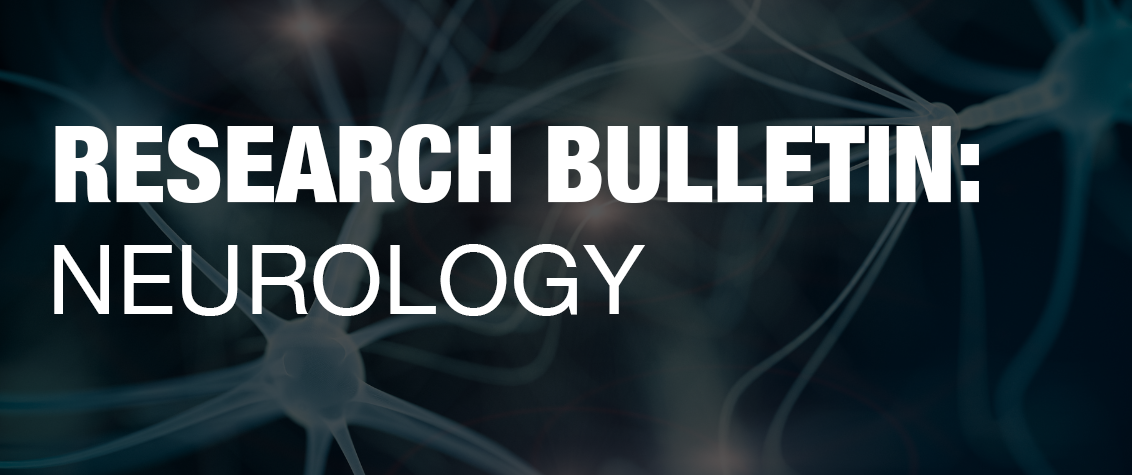

The Department of Neurology research bulletin is updated monthly. Check back for the latest grants, awards, and high-impact publications.
Grants

P30| North Texas Alzheimer's Disease Research Center
Professor Ihab Hajjar, M.D., M.S., was awarded the P30 from the NIH/NIA that designates UT Southwestern as an Alzheimer's Disease Research Center.

R01 | Enabling the therapeutic delivery for spinal cord glioma by epidural light-guided modulation of blood-spinal-cord barrier
Associate Professor Robert Bachoo, M.D., Ph.D., was awarded an R01 from NIH/NCI for "Enabling the therapeutic delivery for spinal cord glioma by epidural light-guided modulation of blood-spinal-cord barrier"

R01 | PET-Derived Measurement of Brain Synaptic Vesicle Glycoprotein 2A (SV2A) – a Potential Biomarker in Patients with Essential Tremor
Professor Elan Louis, M.D., M.S., received an R01 from NIH/NINDS for "Positron Emission Tomography (PET)-Derived Measurement of Brain Synaptic Vesicle Glycoprotein 2A (SV2A) – a Potential Biomarker in Patients with Essential Tremor"
High Impact Publications
Benjamin Greenberg, M.D., M.P.H., Nancy Monson, Ph.D., and collaborators published “A Patient-Derived Antibody Ameliorates Disease Severity in a Relapsing Remitting Murine Model of Multiple Sclerosis” in the Annals of Neurology
Vikram Shakkottai, M.D., Ph.D. and his collaborators published “Autonomous STING signaling in Purkinje cells drives neurodegeneration independent of type I interferon” in Cell Reports
Archive 2025
Grants and Awards

R01 | Post-stroke Cognitive Impairment and Dementia
Associate Professor, Ying Xian, M.D., Ph.D., received an R01 for “Post-stroke Cognitive Impairment and Dementia” from the NIH/NIA.

R01 | Understanding Degeneration in Neurons of the Inferior Olivary Nucleus
Professor, Vikram Shakkottai, M.D., Ph.D., received an R01 for “Understanding Degeneration in Neurons of the Inferior Olivary Nucleus” from NIH/NINDS.
High Impact Publications
Elan Louis, M.D. & Hirofumi Fujita, M.D., Ph.D., and their collaborators published "Axonal pathology differentially affects human Purkinje cell subpopulations in the essential tremor cerebellum" in the Proceedings of the National Academy of Sciences of the USA.
Vikram Shakkottai, M.D., Ph.D., and his collaborators published "Resilience to Endoplasmic Reticulum Stress Mitigates Membrane Hyperexcitability Underlying Late Disease Onset in a Murine Model of SCA6" in Annals of Neurology.
Marc Diamond, M.D., Hirofumi Fujita, M.D., Ph.D., Peter Tsai, M.D., Ph.D., and collaborators published "Cerebellar contributions to tau-mediated cognitive and behavioral dysfunction" in Cell Reports.
Marek Napierala, Ph.D., Jill Napierala, Ph.D., and collaborators published "Antisense oligonucleotide therapy for patients with Friedreich's ataxia carrying the c.165+5G>C splicing mutation" in Molecular Therapy Nucleic Acids.
Darin Okuda M.D., and his collaborators published “Dynamic Expansion and Contraction of Multiple Sclerosis T2-Weighted Hyperintense Lesions Are Present below the Threshold of Visual Perception” in the American Journal of Neuroradiology
DaiWai Olson, Ph.D., R.N., Stephen Bunt, Ed.D., Munro Cullum, Ph.D. , and their collaborators published “Quantitative pupillometry as a potential biomarker in early concussion assessment” in the Journal of Clinical Neuroscience.
Jaime Vaquer-Alicea, Ph.D., Charles L. White, M.D., Elan Louis, M.D., M.S., Marc Diamond, M.D., and their collaborators published “Essential tremor with tau pathology features seeds indistinguishable in conformation from Alzheimer’s disease and primary age-related tauopathy” in Acta Neuropathologica.
Lauren Tardo, M.D., Lindsay Horton, M.D., Peter Sguigna, M.D., Kyle Blackburn, M.D., Shanan Munoz, M.D., Darin Okuda, M.D., and their collaborators published “Faster and better than a physician? Assessing diagnostic proficiency of ChatGPT in misdiagnosed individuals with neuromyelitis optica spectrum disorder” in Journal of the Neurological Sciences.
Jaime Vaquer-Alicea, Ph.D., Daniel Stoddard, Ph.D., Charles L. White, M.D., Lukasz Joachimiak, Ph.D., Sarah Shahmoradian, Ph.D., Marc Diamond, M.D., and their collaborators published “Functional classification of tauopathy strains reveals the role of protofilament core residues” in Science Advances.
Christian LoBue, Ph.D., Amber Salter, Ph.D., Shawn McClintock, Ph.D., Trung Nguyen, M.D., Ph.D., John Hart, M.D., and their collaborators published “High definition transcranial direct current stimulation as an intervention for cognitive deficits in Alzheimer's dementia: A randomized controlled trial” in The journal of prevention of Alzheimer's disease.
Peter Tsai, M.D., Ph.D., and his collaborators published “Neuronal cell type specific roles for Nprl2 in neurodevelopmental disorder-relevant behaviors” in Neurobiology of Disease.
William Dauer, M.D., M.S., Samuel Pappas, Ph.D., and their collaborators published “TorsinA is essential for neuronal nuclear pore complex localization and maturation.” in Nature Cell Biology
Vikram Shakkottai, M.D., Ph.D., Samuel Pappas, Ph.D., and their collaborators published “Increased intrinsic membrane excitability is associated with olivary hypertrophy in spinocerebellar ataxia type 1.” in Human Molecular Genetics
Benjamin Greenberg, M.D., Nancy Monson, Ph.D., Linda Nguyen, M.D., and collaborators published “Astrocytic stress response is induced by exposure to astrocyte-binding antibodies expressed by plasmablasts from pediatric patients with acute transverse myelitis.” in the Journal of Neuroinflammation
Elan Louis, M.D., M.S., and his collaborators published “Purkinje Cell Dendritic Swellings: A Postmortem Study of Essential Tremor and Other Cerebellar Degenerative Disorders.” in Cerebellum.
Ying Xian, M.D., Ph.D., and his collaborators published “Twenty Years of Sustained Improvement in Quality of Care and Outcomes for Patients Hospitalized With Stroke or Transient Ischemic Attack: Data From The Get With The Guidelines-Stroke Program.” in Stroke AHA
Evan Noch, M.D., Ph.D., and collaborators published “Cysteine induces mitochondrial reductive stress in glioblastoma through hydrogen peroxide production.” in Proceedings of the National Academy of Sciences, USA
Archive 2024
Grants and Awards

Peter Sguigna, M.D.
A Phase I Study of Circadian Focused Light Therapy for Fatigue Reduction in Progressive Multiple Sclerosis
Assistant Professor Peter Sguigna, M.D., received a grant for his study “A Phase I Study of Circadian Focused Light Therapy for Fatigue Reduction in Progressive Multiple Sclerosis” from the National Multiple Sclerosis Society.
High-Impact Publications
Munro Cullum, Ph.D., and his collaborator published “Lingering Symptoms Following Sports-Related Brain Injury” in JAMA Network Open.
Kan Ding, M.D., Rong Zhang, Ph.D., and their collaborators published “Age-related smartphone use patterns among individuals with moderate-to-severe traumatic brain injury” in Brain Injury.
Ihab Hajjar, M.D., and his collaborators published “Perceived Stress is Associated with Alzheimer's Disease Cerebrospinal Fluid Biomarkers in African Americans with Mild Cognitive Impairment” in Advances in Alzheimer's Disease.
Erica Jones, M.D., Mehari Gebreyohanns, M.D., DaiWai Olson, Ph.D., R.N., Nneka Ifejika, M.D., M.P.H., and their collaborators published “A qualitative study of barriers and facilitators to using tenecteplase to treat acute ischemic stroke” in the Journal of Stroke and Cerebrovascular Diseases.
Elan Louis, M.D., M.S., and his collaborators pu lished “Reduced Bergmann glial process terminations and lateral appendages in essential tremor” in the Annals of Clinical and Translational Neurology.
Darryl Miles, M.D., Lana Harder, Ph.D., Brett Whittemore, M.D., Benjamin Greenberg, M.D., Cynthia Wang, M.D., and their collaborators published “Increased Intracranial Pressure in Pediatric Myelin Oligodendrocyte Glycoprotein Antibody-Associated Disease” in Neurology neuroimmunology & neuroinflammation.
Amber Salter, Ph.D., and her collaborators published “Investigating the Prevalence of Comorbidity in Multiple Sclerosis Clinical Trial Populations” in Neurology.
Steven Vernino, M.D., Ph.D., Meredith Bryarly, M.D., Amber Salter, Ph.D., and their collaborators published “Randomized controlled trial of intravenous immunoglobulin for autoimmune postural orthostatic tachycardia syndrome (iSTAND)” in Clinical Autonomic Research.
Archive 2023
Grants and Awards

Kan Ding, M.D.
National Institute of Neurological Disorders and Stroke
Associate Professor, Kan Ding, M.D., received her R01 grant: “Cerebral Autoregulation, Brain Perfusion, and Neurocognitive Outcomes After Traumatic Brain Injury (CAPCOG-TBI)”
Cognitive impairment after moderate to severe traumatic brain injury (msTBI) not only significantly affects the quality of life in individuals with msTBI, but also increases the possibility of late-life dementia. The goal of this study is to determine whether acute (< 1 week) cerebrovascular injury and its recovery within the first year postinjury measured by cerebral autoregulation and brain perfusion are associated with cognitive outcome at 12 months after msTBI. The results from this study will improve our understanding of cerebrovascular contributions to cognitive decline related to TBI and provide critical data to inform the development of strategies based on vascular mechanisms to improve cognition after msTBI.

Steven Vernino, M.D., Ph.D.
Professor and Vice-Chair Steven Vernino, M.D., Ph.D., received his R01 grant: “Multimodality Deep Phenotyping of Postural Orthostatic Tachycardia Syndrome (POTS)”.
Postural orthostatic tachycardia syndrome (POTS) is a chronic disorder causing disabling symptoms and substantial loss of productivity. Not all POTS patients are the same, and the causes and significance of different subtypes are not known. For example, some patients may have abnormal regulation of their immune system while others may have problems with the response of their muscles to activity. Exercise training has been shown to be a beneficial treatment for POTS, but about 25% of patients are unable to complete the exercise program. Our research study will examine the different types of POTS by systematically and comprehensively studying a large diverse group of patients. This will include careful assessment of symptoms, blood tests, and heart structure as well as a detailed analysis of the muscle response to exercise. This study will be the first to define the full picture of different POTS subtypes and the relationship between these subtypes. Our studies will allow clinicians to better evaluate and individualize treatment and will guide future POTS research.
High-Impact Publications
- Michael LaCroix, Ph.D. & Marc Diamond, Ph.D. and their collaborators published “Tau seeding without tauopathy” in the Journal of Biological Chemistry.
- Elan Louis, M.D., M.S., and his team published “Associations between cognitive function and a range of significant life events in an elderly essential tremor cohort study” in the Journal of the Neurological Sciences
- Peter Tsai M.D., Ph.D., Juan Pascual, M.D., Ph.D., & Vikram Jakkamsetti, M.D., Ph.D., and their team published “Cerebellar contribution to autism-relevant behaviors in fragile X syndrome models” Cell Reports.
- Rong Zhang Ph.D. and his collaborators published “Cerebral blood flow and cerebrovascular resistance across the adult lifespan: A multimodality approach” in the Journal of Cerebral Blood Flow and Metabolism.
- Darin Okuda M.D. and his collaborators published “Dimethyl Fumarate Delays Multiple Sclerosis in Radiologically Isolated Syndrome” in Annals of Neurology.
- Juan Pascual, M.D., Ph.D. & Vikram Jakkamsetti, M.D., Ph.D. and their collaborators published “Impoverished Conceptions of Gene Causation and Therapy in Developmental Neurology” in Pediatric Neurology.
- Bappaditya Ray, M.D. published “Bundled Treatments in Poor-Grade Subarachnoid Hemorrhage: Do They Help?” in Neurocritical Care.
- Elan D. Louis, M.D., M.S published “Chapter 19 - Essential tremor” in the Handbook of Clinical Neurology.
- DaiWai Olson, PhD, RN, FNCS, and his collaborators published “Original Research: 'Do I See Myself?' Exploring the Potential for Online Images to Attract a Diverse Nursing Workforce” in the American Journal of Nursing.
- Elizabeth Maher, M.D., Ph.D. & Robert Bachoo, M.D., Ph.D., and their collaborators published “Optical blood-brain-tumor barrier modulation expands therapeutic options for glioblastoma treatment” in Nature Communications.
- Juan Pascual, M.D., Ph.D., and his collaborators published “Maintenance of pig brain function under extracorporeal pulsatile circulatory control (EPCC)” in Scientific Reports.
- Nancy Monson Ph.D., and her collaborators published “Neuronal binding by antibodies can be influenced by low pH stress during the isolation procedure” in the Journal of Immunological Methods.
- Kimberly Goodspeed, M.D., and her collaborators published “Electroencephalographic (EEG) Biomarkers in Genetic Neurodevelopmental Disorders” in the Journal of Child Neurology.
- Nancy Monson Ph.D., and her collaborators published “Sex-based differences in effector cells of the adaptive immune system during Alzheimer's disease and related dementias” in Neurobiology of Disease.
- Darin Okuda, M.D., and his collaborators published “Impact of COVID-19 vaccination or infection on disease activity in a radiologically isolated syndrome cohort: The VaxiRIS study” in the Multiple Sclerosis Journal.
- Amber Salter, Ph.D., and her collaborators published “Improving the efficiency of clinical trials in multiple sclerosis” in the Multiple Sclerosis Journal.
- Darin Okuda, M.D., and his collaborators published “Teriflunomide and Time to Clinical Multiple Sclerosis in Patients with Radiologically Isolated Syndrome: The TERIS Randomized Clinical Trial” in JAMA Neurology.
- Nancy Monson Ph.D., and her collaborators published “Neuron-binding antibody responses are associated with Black ethnicity in multiple sclerosis during natalizumab treatment” in Brain Communications.
